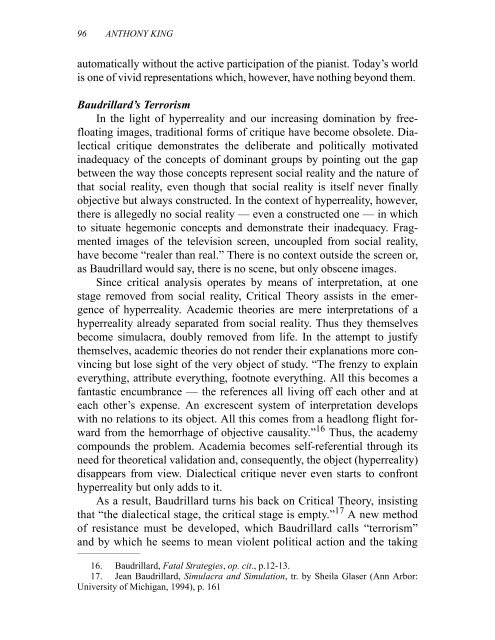King Baudrillard Telos.pdf - Exeter Research and Institutional ...
King Baudrillard Telos.pdf - Exeter Research and Institutional ...
King Baudrillard Telos.pdf - Exeter Research and Institutional ...
Create successful ePaper yourself
Turn your PDF publications into a flip-book with our unique Google optimized e-Paper software.
96 ANTHONY KING<br />
automatically without the active participation of the pianist. Today’s world<br />
is one of vivid representations which, however, have nothing beyond them.<br />
<strong>Baudrillard</strong>’s Terrorism<br />
In the light of hyperreality <strong>and</strong> our increasing domination by freefloating<br />
images, traditional forms of critique have become obsolete. Dialectical<br />
critique demonstrates the deliberate <strong>and</strong> politically motivated<br />
inadequacy of the concepts of dominant groups by pointing out the gap<br />
between the way those concepts represent social reality <strong>and</strong> the nature of<br />
that social reality, even though that social reality is itself never finally<br />
objective but always constructed. In the context of hyperreality, however,<br />
there is allegedly no social reality — even a constructed one — in which<br />
to situate hegemonic concepts <strong>and</strong> demonstrate their inadequacy. Fragmented<br />
images of the television screen, uncoupled from social reality,<br />
have become “realer than real.” There is no context outside the screen or,<br />
as <strong>Baudrillard</strong> would say, there is no scene, but only obscene images.<br />
Since critical analysis operates by means of interpretation, at one<br />
stage removed from social reality, Critical Theory assists in the emergence<br />
of hyperreality. Academic theories are mere interpretations of a<br />
hyperreality already separated from social reality. Thus they themselves<br />
become simulacra, doubly removed from life. In the attempt to justify<br />
themselves, academic theories do not render their explanations more convincing<br />
but lose sight of the very object of study. “The frenzy to explain<br />
everything, attribute everything, footnote everything. All this becomes a<br />
fantastic encumbrance — the references all living off each other <strong>and</strong> at<br />
each other’s expense. An excrescent system of interpretation develops<br />
with no relations to its object. All this comes from a headlong flight forward<br />
from the hemorrhage of objective causality.” 16 Thus, the academy<br />
compounds the problem. Academia becomes self-referential through its<br />
need for theoretical validation <strong>and</strong>, consequently, the object (hyperreality)<br />
disappears from view. Dialectical critique never even starts to confront<br />
hyperreality but only adds to it.<br />
As a result, <strong>Baudrillard</strong> turns his back on Critical Theory, insisting<br />
that “the dialectical stage, the critical stage is empty.” 17 A new method<br />
of resistance must be developed, which <strong>Baudrillard</strong> calls “terrorism”<br />
<strong>and</strong> by which he seems to mean violent political action <strong>and</strong> the taking<br />
16. <strong>Baudrillard</strong>, Fatal Strategies, op. cit., p.12-13.<br />
17. Jean <strong>Baudrillard</strong>, Simulacra <strong>and</strong> Simulation, tr. by Sheila Glaser (Ann Arbor:<br />
University of Michigan, 1994), p. 161
















